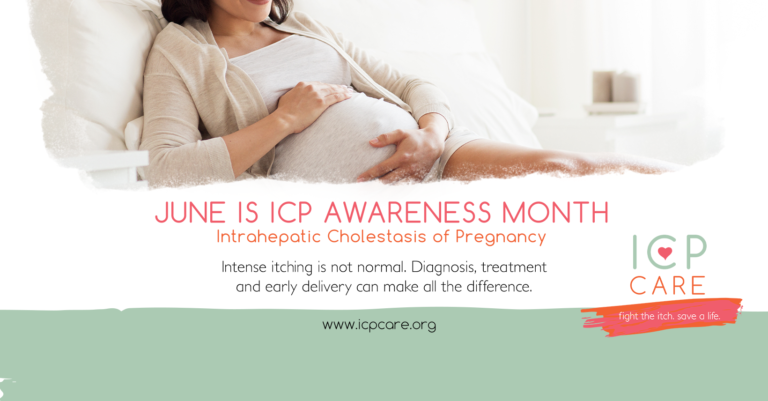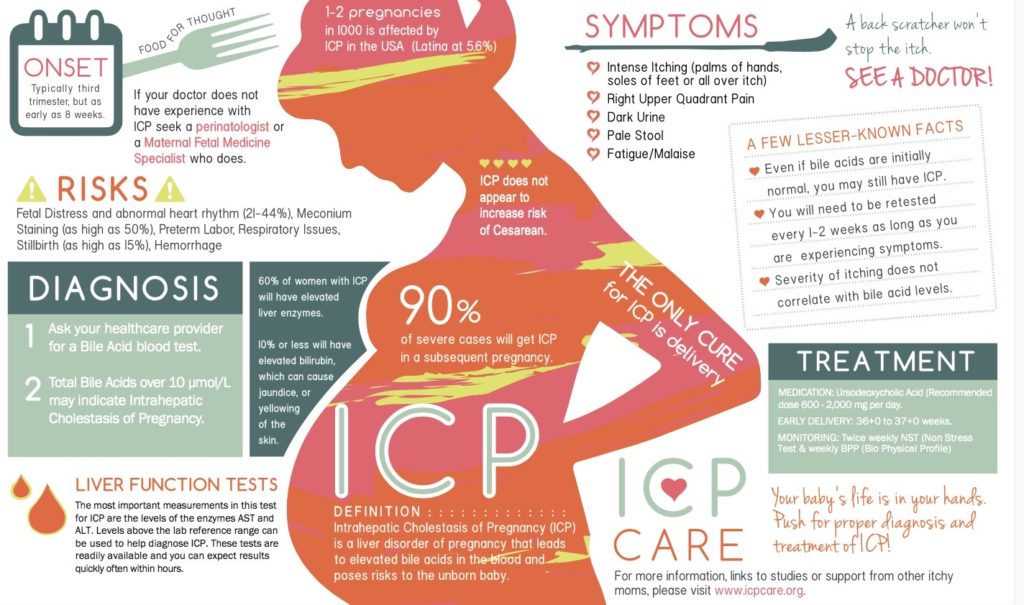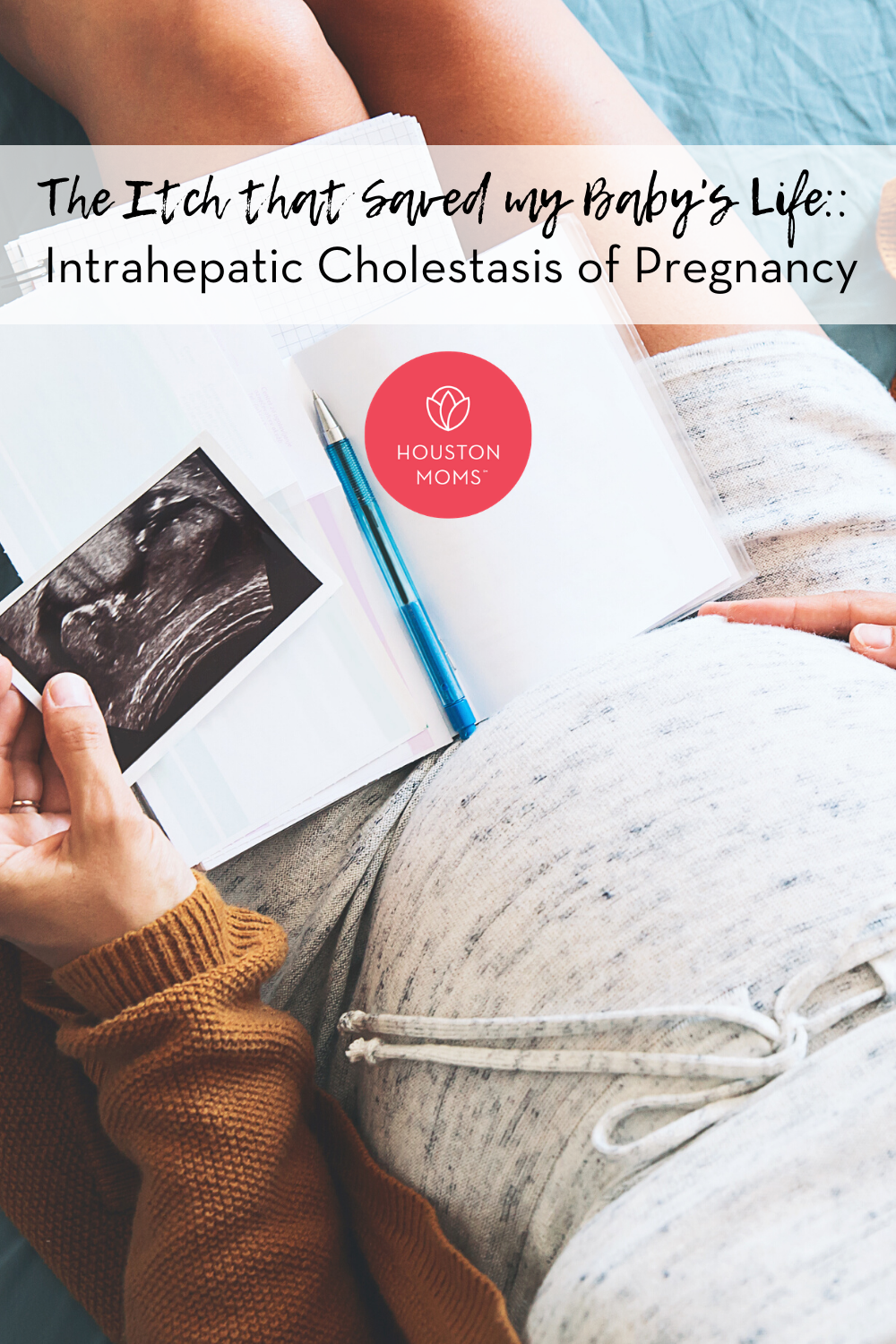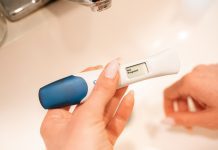
After two healthy, uneventful pregnancies I never imagined that an itch I felt in the middle of the night would lead me to fighting for my third baby’s life. I am one of the less than one percent of women diagnosed in the United States with Intrahepatic Cholestasis of Pregnancy {ICP}. As I pushed for diagnosis and treatment I learned how important it is to be aware of this group of liver disorders that occur in pregnancy. I never anticipated that a lack of awareness would lead me into a battle against my obstetrician that I trusted for years. June is Intrahepatic Cholestasis of Pregnancy {ICP}, and while the percentage of pregnancies that will face these disorders is low, the knowledge is lifesaving.
The Itch
An insane itch woke me from sound sleep one night when I was in my 14th week of pregnancy. It felt as if there were fire ants at the end of my bed attacking my feet. I quickly jumped out of bed and threw back the covers, but saw nothing. I gave in and gave my feet a good scratching, but that did not alleviate the itch. I saw no bites and no rash when I examined my feet and ankles in the brightness of our bathroom lights. I grabbed some Benadryl cream and gave both legs a good dosing and tried to fall back to sleep.
The next morning everything seemed fine and thought it was some crazy pregnancy symptoms that I had not had during my first two pregnancies. It was odd, but I didn’t think much of it until my body woke me up, again, in the middle of the night. The itching started in the bottom of my feet, then worked its way up to my ankles, then covered the lower part of my shin. As I scratched I thought bed bugs had to have traveled home with husband from a recent work trip and had invaded our mattress. Again, when I ripped the sheets off of my bed again there was nothing. I debated scratching my feet with a knife, but thankfully thought ice would be a better option. I went from sleeping with ice packs shoved in my socks to soaking my feet in a tub of ice cold water while praying that the itch would just go away.
During my third night of little sleep I did the one thing that no pregnant woman should not do {especially at 2 am} – I googled my symptoms. My search for “itching feet pregnancy” pulled up an WebMD article titled Cholestasis of Pregnancy. I skimmed through descriptions about how toxins were being released through my feet. I shook my head, gave myself a nice “stay off the web searching” scolding as I put down my phone and tried to sleep through the itch.
The next day I sent my search results by text to my husband who had been on a work trip while all my crazed itching was happening. He gave me a typical “I am sure you are fine” response. When he returned from his trip he got to experience the 2 am insanity of my scratching and my ice routine. After a week of barely any sleep I gave in and called my doctor’s office.
While the intense itching that I faced is the most common symptom of ICP other symptoms include dark urine, pale stool and upper right quadrant pain. Many women have also experience nausea, fatigue and mild depression.
Advocating for Treatment

The March of Dimes has reported that, “Intrahepatic Cholestasis of Pregnancy {ICP} affects about 1 to 2 in 1,000 pregnant women {less than 1 percent} in the United States, and it’s more common in Latina women. About 5 in 100 Latina women {5 percent} in this country have ICP”.
I walked into my doctor’s appointment unprepared for how quickly these symptoms and my concerns were going to be brushed aside. After pleading my case and having my husband {who I brought along for support} back up my story, the doctor agreed to order labs. He wrote a prescription for itching which he claimed, “would make this all a distant memory”.
A week later the itch was still very much there and I was at the point where I could only sleep for an hour at a time. The exhaustion of working full-time, taking care of my middle daughter {who was just a year old} and barely sleeping was taking its toll on me quickly. I called and spoke to my doctor’s nurse. I explained that the itching had not stopped and I believed that was something more going on with my pregnancy. She attempted to assure me that it was just my hormones especially since my blood work was fine. Before we hung up she made sure to scold me a bit by saying, “Oh, sweetie you need to stay off the internet. There are things out that are just meant to scare you”.
I had trusted my obstetrician for a decade prior to this pregnancy. He delivered my two other children and had been in practice so long that many of my friends trusted him with their pregnancies as well. But I knew something was wrong – as mothers we just know when something isn’t right especially with our babies. I headed back to the internet, again {probably just to spite that nurse}. I searched my symptoms over and over, but found nothing else matching what I was going through.
One afternoon after another frustrating phone call with my doctor I hit the internet in rebellion and found a Facebook Group called ICP Care/Itchy Moms. I typed my symptoms into a desperate post for help. Response notification quickly started to appear and a voice had been heard by supportive mothers. I had confirmation that my symptoms, as well as my intuition, was perfectly inline with ICP. ICP Care educated me on the correct blood screens I would need to be diagnosed, a serum bile acid test.
I learned it was common for doctors {even with years of experience} to not be very familiar with ICP and, unfortunately, to have many misconceptions regarding the symptoms. Determined to educate my doctor, I spent hours reading studies which I had printed to present to him at our next appointment. I walked into his office armed with a stack of papers that also included a detailed list of my symptoms and my in-home treatment that had been unsuccessful. Wishing I had a flip chart to help him see how all my symptoms aligned, I took a deep breath as he walked through the examining room door. He skimmed through the papers like he was reading an uninteresting newspaper article. He sighed in disappointment as he agreed to an unscheduled sonogram and more blood work.
Reason for the Fight – The Risks
The studies I spent hours reading on Intrahepatic Cholestasis of Pregnancy gave me the facts I needed for treatment, but also provided an honest look at the risks my baby was facing.
The Risks of Intrahepatic Cholestasis of Pregnancy (ICP) according to ICP Care.
Meconium staining:: Meconium staining is common in late pregnancy, however, in an uncomplicated pregnancy it is quite rare at 37 weeks. In an ICP pregnancy, it is common at 37 weeks, affecting 44-58% of women at this gestation. Discovery of meconium staining (e.g. in an amniocentesis) warrants immediate delivery during Intrahepatic Cholestasis of Pregnancy as it is highly associated with the risk of stillbirth in these pregnancies.
Preterm labor and delivery:: Preterm delivery occurs spontaneously (meaning not induced) in about 20-40% of ICP pregnancies. While it is considered a part of active management to induce early, delivering the baby too soon comes with considerable risks.
Respiratory Distress Syndrome (RDS) and failure to establish breathing (fetal asphyxia):: ICP babies are at higher risk of respiratory issues at birth. These issues are considered a part of the disease process and are not necessarily due to the practice of early delivery, since they occur even when the lungs are known to be mature and they also occur at much higher rates than in non-ICP babies who are born at the same gestational age.
Stillbirth {Intrauterine Fetal Demise}:: Without active management the risk of stillbirth during an Intrahepatic Cholestasis of Pregnancy can be as high as 15%. However, with active management, including the medication Ursodeoxycholic Acid and early delivery {typically by 36-37 weeks gestation}, the risk is thought to be about the same as an uncomplicated pregnancy, meaning less than 1%.
ICP Treatment
“Without active management” was the phrase that fueled my quest for knowledge. Oh, how I wish I could say that fight to be treated correctly and effectively was over after I bestowed a stack of studies to my doctor. I quickly turned to a specialist in obstetricians and gynecologists for a second opinion. The specialist diagnosed me with ICP and prepared his recommendation for treatment which was inline with the ICP Care treatment plan.
ICP Care lists three areas in their treatment plan.
- Medication:: While ICP Care lists many medications that could be prescribed after diagnosis, Ursodeoxycholic Acid {UDCA, Ursodiol, Actigall} has been ruled the most important for successful treatment.
- Early Delivery:: Since it is not possible to predict which pregnancies are at risk for stillbirth, it is recommended that all ICP pregnancies, both mild and severe, be delivered early, even if serum bile acids return to normal after treatment with UDCA. It is suggested to deliver at 36 -37 weeks.
- Additional Monitoring:: Early delivery and UDCA are essential in treatment ICP Care suggests additional fetal monitoring after diagnosis accompanied with continued blood work.

After receiving the specialist treatment plan my OBGYN made it very clear that I was battling against not only his misconceptions, but also his ego. At first he actually refused to read the treatment. After a heated telephone from my specialist, my OBGYN agreed to start me on UDCA, but refused to deliver at 36 weeks. This was a battle until my 35th week of pregnancy when my doctor actually said, “Well, I guess you are getting what you want and you will be induced next week”. I looked him straight in the eye and said, “What I want is to leave that hospital with a healthy baby”. At the time I felt I had no other choice, but to have him deliver my child since I had already paid him in full.
A week later, at 36 weeks gestation, my labor was induced. Delivery was fairly uneventful, but the nurses were taken back when my doctor and I refused to speak to each other. After years of trusting him with the health of my babies we parted ways because my fight for this pregnancy was too much for his over inflated ego. Though, she did endure some extra tests in the hospital to rule out any respiratory and heart issues, my daughter did not have to spend time in the NICU. She was smaller then my other babies, weighing barely 6 pounds at birth, but today she is a very healthy seven year old.
Each mother’s ICP story looks different. I learned how to advocate for my baby’s health through research and pure determination. Pushing for a correct diagnosis and treatment is not uncommon, but with increased awareness the fight is getting easier. My hope is that less women will face the demise of relationship with a medical professional that they once trusted with the life of their babies. And that awareness of ICP will continue to to increase. I owe so much of my success to ICP Care. Their team of volunteers and medical advisors have provided the needed resources to assist women in discussion with medical professionals. They also created a community of mothers who have faced this diagnosis and are equipped to rally around fearful mothers.
















